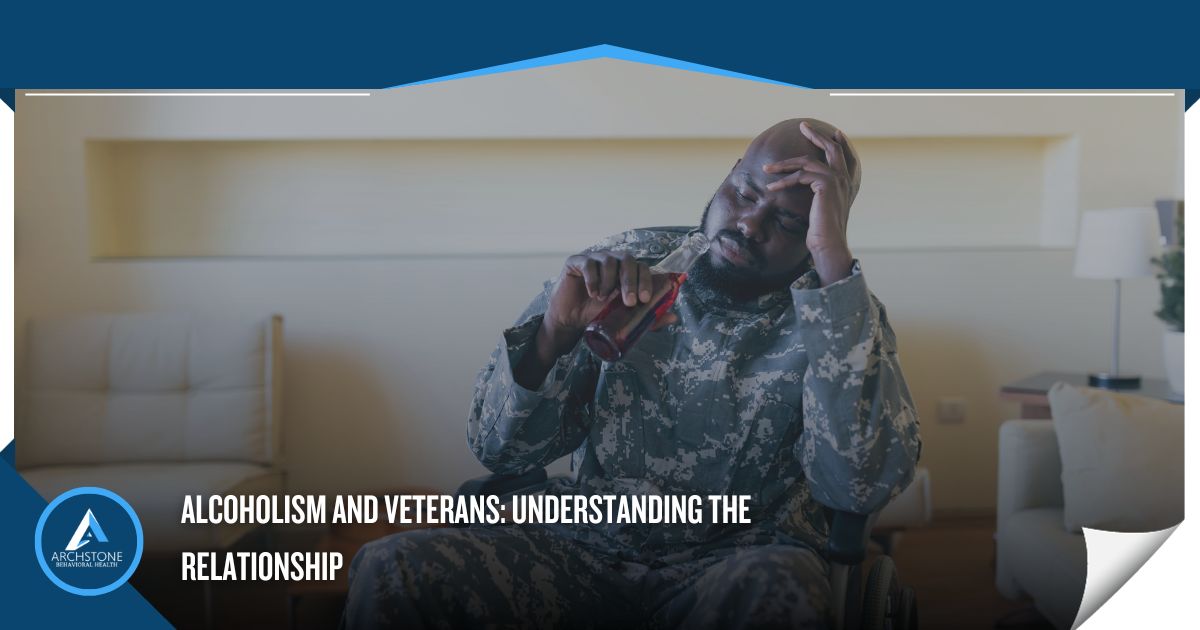Alcoholism and Veterans: Understanding the Relationship
Get Help Now

According to the Substance Abuse and Mental Health Services Administration (SAMHSA), 7 in 10 veterans with a substance use disorder struggle with alcoholism.[1]
If you or a loved one are a veteran who struggles with alcohol abuse, it’s important to understand the connection. Since many veterans often have a hard time finding support, they deal with their emotions, negative memories, and life stressors by drinking alcohol. Over time, this leads to alcoholism, which must be treated with a focus on trauma-informed care.
Why is Alcoholism Common Among Veterans?
Alcoholism is a common issue that affects many veterans, but why? Veterans deal with a myriad of lasting problems that make it difficult to function in their daily lives. From difficult emotions and memories to mental health conditions and even homelessness, sometimes drinking alcohol is the only way they know how to cope.
Unfortunately, eventually, alcohol stops becoming a coping mechanism and becomes a priority. Once you develop alcoholism, it can be difficult to overcome without professional treatment.
Self-Medication
While not every veteran sees combat, being in the service can be stressful, overwhelming, and difficult. Even without seeing combat, it is possible to experience trauma while serving in the military.
Once you get home, your entire world changes. Dealing with the transition from military to civilian life can be incredibly strenuous psychologically. As a result, many veterans begin drinking alcohol to cope.
When veterans self-medicate difficult emotions with alcohol, they may eventually become addicted. Over time, the alcohol will not numb their feelings anymore, only providing them with relief from cravings and withdrawal symptoms.
Homelessness
Unfortunately, many veterans deal with homelessness when they are out of the service. According to the U.S. Department of Veterans Affairs (VA), in 2022, “19,565 Veterans experienced sheltered homelessness, and 13,564 Veterans experienced unsheltered homelessness.”[2]
When veterans are experiencing homelessness, they might feel depressed, and hopeless, or even be exposed to traumatic events daily. This can cause them to begin relying on alcohol to feel better, initiating the cycle of alcoholism.
Trouble at Home
Oftentimes, the mental health issues that veterans deal with cause them to have interpersonal relationship issues, especially in their own homes. Whether they are constantly arguing with their spouse, children, or other loved ones, this can take a serious toll. Without psychological help, difficulties at home could cause them to begin drinking alcohol to cope.
Unfortunately, when veterans mix alcohol and relationship issues, nothing good comes of it. There are high rates of domestic abuse among veterans, likely as a result of alcohol abuse and untreated mental health issues.[3]
Post-Traumatic Stress Disorder (PTSD)
Lastly, many veterans struggle with post-traumatic stress disorder (PTSD), a mental health condition that stems from experiencing traumatic events. According to the VA, 7% of veterans have PTSD.[4]
PTSD can cause a variety of symptoms, including mood swings, flashbacks, nightmares, and even social isolation. When veterans are dealing with these symptoms without mental health support, it’s easy to begin drinking alcohol to cope. The VA reports that between 60 to 80% of Vietnam veterans seeking support for PTSD also struggle with alcoholism.[5]
Signs You Need Treatment for Alcoholism
If you are a veteran who drinks alcohol frequently, it is beneficial to be aware of the signs of alcoholism. If you believe that you are suffering from an alcohol use disorder, you should always seek treatment from an alcohol rehab center that specializes in treating veterans and the trauma they struggle with.
The top signs you need treatment for alcoholism include:[6]
- Drinking more or longer than you intended to
- Wanting to cut down on or stop drinking but being unable to
- Spending a lot of time drinking and recovering from the effects of alcohol
- Experiencing strong urges or cravings to drink alcohol
- Drinking often interferes with taking care of family, going to school, or working
- Continuing to drink despite facing interpersonal issues as a direct result
- Losing interest in previously enjoyed activities to drink more often
- Getting into risky situations while drinking, such as driving under the influence
- Continuing to drink despite facing physical or mental health effects
- Needing to drink more than you used to to experience the same effect
- Experiencing symptoms of alcohol withdrawal when you are not drinking alcohol
Find Help for Alcoholism as a Veteran
If you or a loved one are a veteran who struggles with alcoholism, you are not alone. At Archstone Behavioral Health, our alcoholism treatment services are designed to help veterans take back their power over their lives. With our master-level clinicians, luxury facilities, and unique approach, you can rest assured your loved ones are in caring and capable hands.
To learn more about our alcohol rehab program for veterans, contact us today.
References:
- The Substance Abuse and Mental Health Services Administration (SAMHSA): 2020 National Survey on Drug Use and Health: Veteran Adults, Retrieved November 2023 From https://www.samhsa.gov/data/sites/default/files/reports/rpt37926/2020NSDUHVeteransSlides072222.pdf
- The U.S. Department of Veterans Affairs (VA): Point-in-Time (PIT) Count, Retrieved November 2023 From https://www.va.gov/homeless/pit_count.asp
- The U.S. Department of Veterans Affairs (VA): Intimate Partner Violence: Prevalence Among U.S. Military Veterans and Active Duty Servicemembers and a Review of Intervention Approaches, Retrieved November 2023 From https://www.hsrd.research.va.gov/publications/esp/partner_violence.cfm
- The U.S. Department of Veterans Affairs (VA): How Common is PTSD Among Veterans, Retrieved November 2023 From https://www.ptsd.va.gov/understand/common/common_veterans.asp
- The U.S. Department of Veterans Affairs (VA): PTSD and Problems With Alcohol Use, Retrieved November 2023 From https://www.ptsd.va.gov/understand/related/problem_alcohol_use.asp
- The National Institute of Alcohol Abuse and Alcoholism (NIAAA): Understanding Alcohol Use Disorder, Retrieved November 2023 From https://www.niaaa.nih.gov/publications/brochures-and-fact-sheets/understanding-alcohol-use-disorder